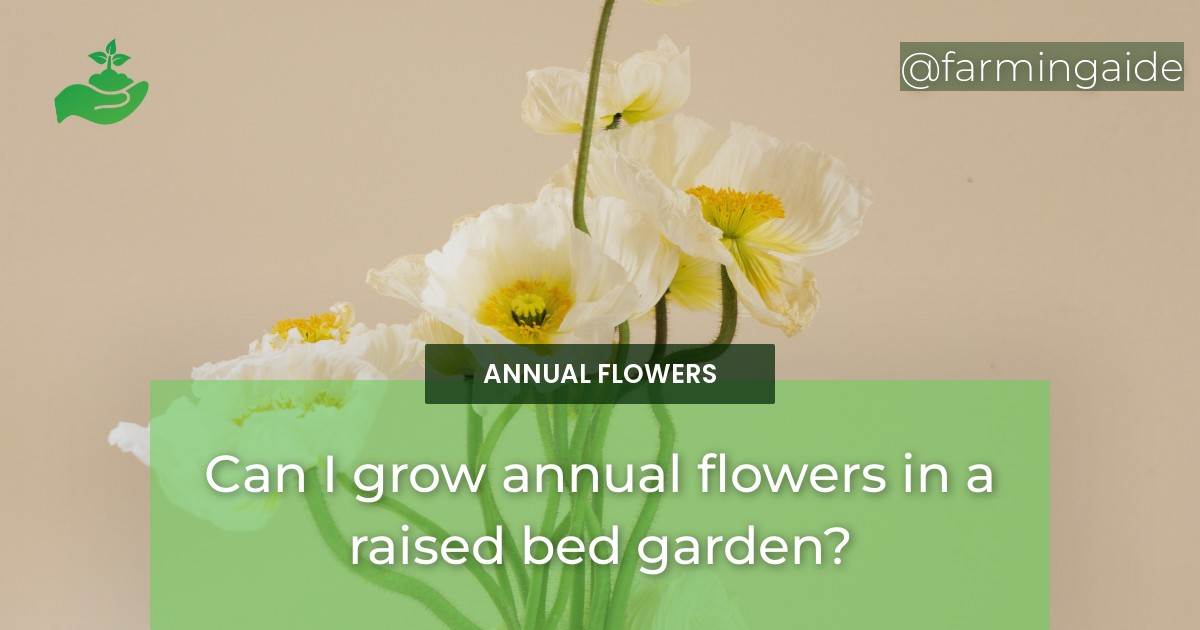Yes, you can grow annual flowers in a raised bed garden, and it can be a rewarding and enjoyable experience. Growing annual flowers in a raised bed garden allows for increased control over soil quality and drainage, improved accessibility for planting, maintenance, and harvesting, reduced weed growth and soil compaction, longer growing seasons, and higher yields. However, proper soil preparation, drainage, planting techniques, and maintenance are critical to creating a beautiful and thriving garden that will provide you with colorful blooms all season long.
Tips for Growing Annual Flowers in Raised Bed Gardens
Soil Preparation
Choosing the right soil for your raised bed garden is crucial. The ideal soil for annual flowers is well-draining, loose, and fertile. Here are some soil preparation tips:
- Choose a high-quality potting mix or create your growing mix by combining equal parts garden soil, peat moss, and perlite or vermiculite.
- Add compost and other organic matter to your soil to improve soil fertility, texture, and structure.
- Fertilize your soil before planting with a balanced, slow-release fertilizer to provide your plants with essential nutrients throughout the growing season.
- Test your soil’s pH levels to ensure they are optimal for the annual flowers you plan to grow. Most annual flowers prefer a slightly acidic soil pH between 6.0 and 7.0.
Drainage
Proper drainage is essential for a healthy raised bed garden. Poor drainage can lead to root rot, fungal diseases, and stunted plant growth. Here are some drainage tips:
- Ensure proper drainage in your raised bed garden by creating drainage channels in your soil and avoiding overwatering your plants.
- Use a layer of gravel or rocks at the bottom of your bed to improve drainage.
- Consider installing a drainage system or using a rain barrel to collect excess water.
Planting Techniques
Choosing the right annual flowers for your garden, planning your planting layout, properly spacing your plants, and mulching your soil are critical for a successful raised bed garden. Here are some planting tips:
- Choose the right annual flowers for your garden based on your climate, soil type, and sun exposure. Consider factors such as bloom time, color, height, and fragrance.
- Plan your planting layout carefully to ensure optimal plant growth. Consider factors such as plant height, spacing, and sun exposure.
- Properly space your plants to avoid overcrowding, which can lead to poor air circulation and increased risk of disease.
- Mulch your soil to retain moisture and prevent weed growth. Use organic mulch such as shredded leaves, straw, or compost.
Maintenance Tips
Proper maintenance is essential for a thriving raised bed garden. Here are some maintenance tips:
- Regularly check soil moisture levels and water your plants as needed. Most annual flowers prefer consistently moist soil.
- Deadhead your flowers regularly to promote blooming and prevent seed formation. This encourages plants to produce more flowers and extend the blooming season.
- Prune your plants to encourage growth and prevent overcrowding.
- Monitor for pests and diseases and take action promptly if you notice any issues. Consider using natural pest control methods such as companion planting or beneficial insects.
Additional Considerations
Choosing the right location for your raised bed garden, providing adequate sunlight for your plants, properly watering your plants, and using companion planting to benefit your garden are also critical for a successful raised bed garden. Here are some additional considerations:
- Choose a location for your raised bed garden that receives at least six hours of direct sunlight per day. Most annual flowers prefer full sun to partial shade.
- Water your plants deeply and consistently to promote healthy root development. Consider using a drip irrigation system or watering early in the morning to prevent evaporation.
- Use companion planting to benefit your garden by pairing plants that have complementary needs or repel pests.
Benefits of Growing Annual Flowers in Raised Bed Gardens
Growing annual flowers in raised bed gardens offers several benefits, some of which include:
- Increased control over soil quality and drainage
- Improved accessibility for planting, maintenance, and harvesting
- Reduced weed growth and soil compaction
- Longer growing seasons and higher yields
Are Annual Flowers Suitable for Different Types of Garden Beds?
Yes, annual flowers are suitable for different types of garden beds, including rock gardens. When growing annual flowers in rock gardens, it’s important to choose varieties that can thrive in the specific conditions, such as well-drained soil and full sunlight. With the right care, annual flowers can add color and beauty to any type of garden bed.
Conclusion
With proper soil preparation, drainage, planting techniques, and maintenance, you can create a beautiful and thriving raised bed garden that will provide you with colorful blooms all season long. Choose the right annual flowers for your garden, plan your planting layout carefully, and consider additional factors such as location, sunlight, and watering. By doing so, you can enjoy the many benefits of growing annual flowers in raised bed gardens.


